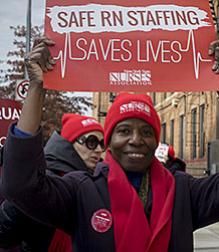
We see it every day, in most units, on virtually every floor: patients arriving at the hospital with greater acuities and in need of comprehensive care. We have been saying for the last several years that healthcare delayed would have dire results. Well, that’s exactly what’s happening.
According to studies published in the Wall Street Journal this summer, 27% of those new to the healthcare system, having recently enrolled with insurance companies under the Affordable Care Act (ACA), exhibit “significant health issues such as diabetes, psychiatric conditions, asthma, heart problems or cancer.”
In comparison, people who had coverage and kept it had these same significant health issues at the much lower rate of 12%. That translates into more than one million Americans with serious health conditions that went untreated.
It is also compelling evidence of the greater need for hospital care as the serious consequences of delayed and denied care are more apparent.
These data, drawing on studies of Inovalon Inc., a health-technology firm that crunches figures from 200 insurance companies, “provides the clearest picture so far,” according to WSJ, of the health status of patients newly arrived in the healthcare system.
Playing catch up
Another 2014 study, by The Commonwealth Fund, merits a serious look. Comparing the U.S. healthcare system with that of 10 other industrialized countries, the U.S. rated poorly, on the bottom in terms of outcomes and last or near last on measures of access, efficiency and equity. Other countries compared were Australia, Canada, France, Germany, the Netherlands, New Zealand, Norway, Sweden, Switzerland and the United Kingdom.
The study, which pre-dates the implementation of the ACA, is most pointed on access. “Not surprisingly,” the study relates, “given the absence of universal coverage, people in the U.S. go without needed healthcare because of cost more often than people do in the other countries….Americans with below-average incomes were much more likely than their counterparts in other countries to report not visiting a physician when sick, not getting a recommended test, treatment, or follow-up care; or not filling a prescription or skipping doses when needed because of costs.” More than one-third (37%) of U.S. adults reported forgoing a recommended test, treatment, or follow-up care because of cost.
We have seen this sobering data before on the large percentage of people who have foregone care due to cost. What we are seeing now is the compelling connection between missing care and serious illness.
Playing catch up on healthcare
The costs of exclusion from care are very high, especially when gauged in acuities. The cancer that went untreated, the heart condition unattended, the diabetes uncontained, the asthma unaddressed, the depression unrevealed… these are the real human costs to a system that puts profits before patients.
Playing catch up in healthcare is our nation’s great challenge, now that more people are covered by health insurance and with an expanded system of Medicaid in many states that gives care to more families. If we are ever to build a comprehensive quality primary care system for everyone in this country we have some very serious catching up to do.
Healthcare is a matter of catch up in the U.S. We can do it with a strong national commitment. It cannot be done without keeping our hospitals open and thriving, and by a determined effort to make quality patient care the number one priority.




